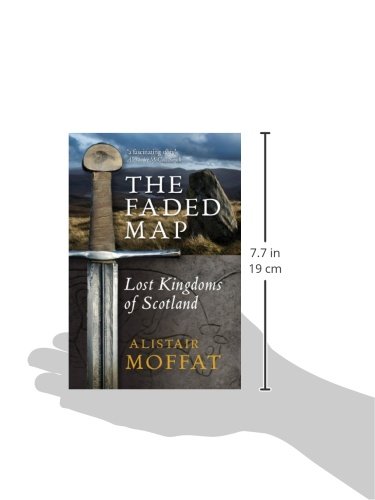


The Faded Map: The Lost Kingdoms of Scotland
P**N
Interesting but some maps would have been helpful
The author provides some background of the various sources he used in compiling this history. I found the info on the Roman historians particularly interesting, though it did seem to drift off course a bit. There was also a lot of detail at times and again felt like it meandered a bit. Still, this book provided a lot of interesting history on these ancient kingdoms of northern England and Scotland. I enjoyed the photos at the back, but some maps included as these kingdoms and people were discussed would have been very helpful.
O**N
The 'lost kingdoms' are now found.
This is an excellent book on a somewhat esoteric topic. It is readable, and well documented. The nature of the topic and the time period involved, which is the period of the Roman occupation of Britain and the early "dark ages" following the end of Roman occupation requires any author to make assumptions to fill in some gaps which do not have verifiable records to rely on. The author does not abuse this situation with assumptions that do not have supporting circumstantial evidence, and he clearly indicates when he is writing about matters that do not have solid records to prove their facts conclusively. The book should appeal to most Scot's history buffs because it fills in many gaps which are not covered in general histories.This is a valuable resource, definitely worth reading.
P**Y
Good overview
This is a good survey of the post-Roman and early medieval kingdoms of northern Britain. It presumes a lot of prior knowledge of the Scots and Picts, and so skips over these two major cultures. This isn't a huge detriment, but it does deprive some of these kingdoms of their larger context.
C**R
Amazing and Informative
As an amateur historian and lecturer on European history from the Celtic viewpoint, I am amazed at the depth of detail Mr. Moffat has accomplished from scanty and arcane sources. His grasp of Old Welsh, Gaelic, early English and Latin have clarified many issues for me. His geographic references have been most useful in pinpointing ancient historic sites and locales. Bear in mind this is a forgotten and sparsely documented period in European history - reading Moffat is like finding the Rosetta Stone. If you have any interest in understanding this seminal point in history, this is invaluable research. And he is a good writer and interesting to read. A must.
A**Y
Fascinating journey through history
This book shed some light on the happenings of Northern Britain during the dark ages and filled in many gaps for me on the subject. Truly well worth the read
C**F
ExcellentMay 27 at 12:48 AM Faded Map My review was intended to give 5 stars Columbcille
Mr Moffat, after considerable research, writes a gripping account of the almost forgotten kingdoms in Scotland.Of the Britons / Cymri ,Scots of Dalriada , the Picts (Caledonians), Saxons from Bernicia, and the the Vikings , and the earlier mighty Roman Empire efforts and Roman Britons, leading to the legend of Dux Commander " Arthur' and his 12 battles with the last one at Badon Hill.The Saxons wrote him out of history.Great effortMay 27 at 12:48 AMFaded Map My review was intended to give 5 stars Columbcille Columbcille
N**T
This is a great book
I've been able to start tracing family history.
M**L
Forgotten to Time
A good read for any history buff of the British isles. Talks extensively about kingdoms of a by gone age that no longer exists. Helps explain the fluid situations in the border regions between Scotland and England long before the current boundaries were established.
G**C
Now You Know!
How do you know to look for what you never knew about Scotland? Read this book, now I want to know more! Another source of Scottish history, I found an extremely unbiased & "un-UK'd" is from the old colonies, like Nova Scotia.
E**S
Great book
Great book
R**N
KIndle and Book
Fascinating and well told,
A**S
Five Stars
Combines scholarly content with accessible reading
M**G
First class
It has so much fascinating background information on the British post-Roman period, and it's so well written, that I was sorry I hadn't read it earlier in my life. It relates landscapes to place names and historical events from chroniclers, poems, and passed down oral accounts. He takes issue with the strict academic approach of having to prove something before you write it. He is so well versed in his subject(s) that he is also able to exercise his intuition about situations and he extrapolate within self-imposed limits -- so what he writes is never dry. It always tugs at the reader's own imagination. If you want to know why Irish Gaelic is so different from Welsh and from Scottish Gaelic, I recommend this book. Every few pages a WOW!
Trustpilot
5 days ago
1 week ago